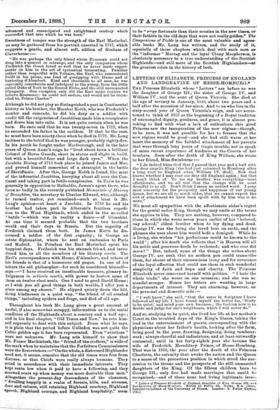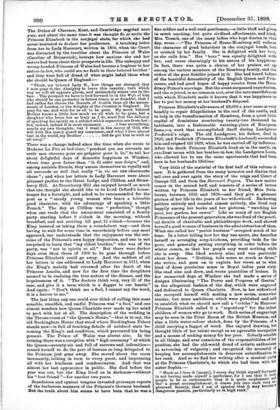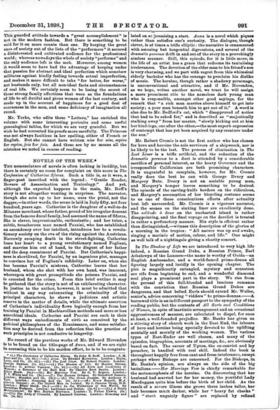LETTERS OF ELIZABETH, PRINCESS OF ENGLAND AND LANDGRA.VINE OF HESSE-HOMBURG.*
THE Princess Elizabeth whose " Letters " are before us was the daughter of George III., the sister of George IV. and William IV., and the aunt of Queen Victoria. She died at the age of seventy in January, 1840, about two years and a half after the accession of her niece. And to us who live in the
sixty-second year of Queen Victoria's reign, and are accus-
tomed to think of 1837 as the beginning of a Royal tradition of unexampled dignity, goodness, and grace, it is almost pro- voking to find with what a lack of enthusiksm this good Princess saw the inauguration of the new regime—though, to be sure, it was not possible for her to foresee that the new regime would be good—and she had still warm at her
heart the memory of the faithful attachment of her parents that wore through long years of tragic trouble, not to speak of more recent experience of kindness at the Courts of her brothers. Soon after the death of King William, she wrote to her friend, Miss Swinbnrne
"I do indeed bless God that I passed that year and a half with the dear angelic King [she had just returned to Homburg after a long visit to England when William IV. died]. Now God knows whether I may ever see dear old England again ; but that I won't think of. To me my brother was everything—most affectionate, and we all feel that the change will be most dreadful to us all. Don't think I mean an unkind word. I pray most sincerely for the prosperity and happiness of our young Queen, but we are all so much older, that we cannot expect the sort of attachment we have been spoilt with by him who is no more."
We must all sympathise with the affectionate sister's regret for the genial sailor-King, though we may smile at the terms she applies to him. They are nothing, however, compared to those in which she wrote seven years earlier of her "beloved, nay adored," eldest brother when he lay dying and dead.
George IV. was the being she loved best on earth, and the phrases she uses about him would befit a demigod. While he is living, she wishes "his perfections could be known to the world"; after his death she reflects that "in Heaven will all his noble and generous deeds be reckoned ; and who ever did more ? " But, indeed, some of the things she writes about George IV, are such that no modern pen could transcribe them, for shame of their unconscious irony and for reverence of the loyal affection that could use them in such wonderful simplicity of faith and hope and charity. The Princess Elizabeth never concerned herself with politics. "I hate the whole trade," she wrote on one occasion; and she was nc scandal-monger. Hence her letters are wanting in large departments of interest. They are charming, however, on the personal and domestic side :—
"I well know," she said, "that the verse in Scripture I have followed all my life I have found myself the better for, 'Study to be quiet,' and mind your own business ; the fashion now is to decide and judge for one's neighbours, which I will never do."
And so, studying to be quiet, she lived her life at her mother's Court in the troubled days of the King's illness, taking the lead in the entertainment of guests, corresponding with the
physicians about her father's health, looking after the farm, being good to the poor, drawing, designing, doing tambour- work; always cheerful and industrious, and at least outwardly contented ; until in her forty-eighth year she became the wife of Frederick, Hereditary Prince, of Hesse-Homburg. That was in 1818, the year after the death of the Princess
Charlotte, the calamity that awoke the nation and the Queen to a sense of the precarious position in which stood the suc- cession to the throne and the prospects of the still unmarried daughters of the King. Of the fifteen children born to
George III., only five had made marriages that could be recognised,—and of these none had living legitimate issue.
• Letters of Princeas nizabetri of Ragland, Daughter of King George III. ant. Landgrarine of Hesso.11,mietro. Edited by Philip Oh. Yorke, M.A. t)zo,t, Lieeneie-es-Lettres of the University of France. London; T. Esher urovia. 112s.]
The Dukes of Clarence, Kent, and Cambridge =spied next year, and about the same time it was thought fit iat settle the Princess Elizabeth in the conjugal state, for which she had never hesitated to declare her preference. A touching letter from her to Lady Harcourt, written in 1806, when the Court was distracted by the troubles about the Princess of Wales (Caroline of Brunswick), betrays how anxious she and her sisters had been about their prospects in life. The unhappy and wrong-beaded Princess of Wales had become a bugbear to her sisters-in-law, who could see no fault in their beloved brother' and they were full of dread of what might befall them when she should be Queen of England
Think, my beloved Lady H., how things are changed, that I now pray to the Almighty to leave this country; turn which way we will all appears gloom, and melancholy stares one in the face. The prospect we have to look forward to in the Wife of him who should be our protector in future times, is so dreadful, that I had rather far choose the Deserts of Arabia than all the amuse- ments of London, or the delights of the Country in England. Do pray for me, and wish for us all to be gone. My much beloved Mother knows a little how much we all wish to be gone, but a daughter who loves her as truly as I do, must feel the delicacy of speaking too openly on a subject which separates one from her ; but, indeed, indeed it is most necessary I fear everything, nearly my own thoughts ; but I trust in the mercy of God, who will with His mercy guard my conscience, and what I love almost best in the world, my Brother but do get him to wish us all away."
There was a change indeed since the time when she wrote to Madame La Fite at bed-time, "pendant que ma servants me mule mes cheveux pour me preparer pour le lit," to tell her
about delightful days of domestic happiness at Windsor, where time goes faster than "le fil entre mes doigts," and, among amiable friends, they amuse themselves so royally and
all succeeds so well that really " la vie est une charmante chose "; p.nd when her letters to Lady Harcourt were about
pleasant parties to the Great Lodge, and Clifdon, and Straw- berry Hill. At Strawberry Hill she enjoyed herself so much
that she thought she should like to be Lord Orford's house-
keeper for a fortnight, and asked to be recommended for the post as a "steady young woman who bears a tolerable good character, with the advantage of speaking a little French." The day at Clifdon was "perfection," though when one reads that the amusement consisted of a family party starting before 9 o'clock in the morning, without breakfast, and not arriving till past 12 o'clock—because the King insisted on taking them a roundabout way—and then having to wait for some time in uncertainty before any meal appeared, one understands that the enjoy-pent was the out- come of the Princess's own happy disposition, and one is not
surprised to learn that "my eldest brother," who was of the party, was "not in spirits at all." But there were darker
days even than those of 1806 to be gone through before Princess Elizabeth could go away. And the saddest of all her letters is one addressed to Lady Harcourt in 1811, when the King's malady had returned after the death of the Princess Amelia, and now for the first time the daughters seemed to be realising the true nature of the disease, and the hopelessness of it. "The doctors think very, very ill of the case, and give it a term which is a dagger to our hearts." And again : "Don't think me a fool, I cannot say the word, it is a horror to me."
The last thing any one could ever think of calling this most sensible, unselfish, and useful Princess was "a fool," and one almost wonders how Queen Charlotte ever made up her mind to part with her at all. The description of the wedding in the Throne-room at "the Queen's House,"—that is to say, the old Buckingham House that stood where Buckingham Palace
stands now—is full of touching details of subdued state be- coming the King's sad condition, which prevented his being present. The Prince of Wales was absent also. In the evening there was a reception with" high ceremony" at which the Queen—seventy-six and full of sorrows and infirmities—
roused herself to do the part of hostess so long delegated to the Princess just gone away. She moved about the room incessantly, talking in turn to every guest, and impressing all with her kindness and condescension. And that was almost her last appearance in public. She died before the year was out, but the King lived on in darkness—without his "best friend "—for another two years.
Scandalous and cynical tongues invented grotesque reports of the barbarous manners of the Princess's German husband.
But the truth about him seems to have been that he was a
fine soldier and a well-read gentleman,—a little bluff and given to much smoking, but quite civilised, affectionate, and kind.
Mrs. Trench, one of the many ladies who kept diaries in that day, wrote :—" The Princess of Hesse-Homburg will redeem
the character of good behaviour in the conjugal bonds, lost or mislaid by her family. She is delighted with her hero, as she calls him." Her " hero " was equally delighted with her, and wrote charmingly to his sisters of his happiness. In fact, there was quite a chorus of her praises set up among the various members of the Homburg family, and the widow of the poet Schiller joined in it. She had heard before
of the beautiful domesticity of the English Queen and Prin- cesses, and bad good hopes of happy results from the Here-
ditary Prince's marriage. But the event surpassed expectation, and she rejoiced, in no common sort, over the rare unselfishness with which Elizabeth made it known that it was happiness to her to put her money at her husband's disposal.
Princess Elizabeth's allowance of 26,000 a year came in very handily to repair dilapidations in the roof of the castle, and to help in the transformation of Homburg, from a quiet little capital of dominions numbering twenty-two thousand in-
habitants, into a fashionable watering-place of European fame,—a work that accomplished itself during Landgrave Frederick's reign. The old Landgrave, his father, died in
1820, and Frederick (Princess Elizabeth's husband) succeeded him and reigned till 1829, when he was carried off by influenza.
After his death Princess Elizabeth lived on in the castle, on excellent terms with her brother-in-law, the Landgrave Louis, who allowed her to use the same apartments that had been hers in her husband's lifetime.
Very little of the material of the first half of this volume is new. It is gathered from the many memoirs and diaries that tell over and over again the story of the reign and Court of
George III. and from the Harcourt Papers. The new matter comes in the second half, and consists of a series of letters written by Princess Elizabeth to her friend, Miss Swill- burne, between 1832 and 1838—and they give a pleasant picture of her life in the years of her widowhood. Eschewing
politics entirely and scandal almost entirely, she lived very happily among her books and her pictures, "watching her poor, her garden, her cowes." Like so many of our English Princesses of the present generation, she was fond of the practi- cal details of charitable and philanthropic work, and showed herself a good woman of business in the administration of them.
What she called her "parish business" occupied much of her time. In a letter telling how her day was spent, she describes herself as arranging soup-kitchens, providing beds for the poor, and generally setting everything in order before the winter comes, so that her people may want nothing while
she is away. She liked society also, and was particular about her dress. "Nothing tells sense so much as dress," she writes, and goes on to explain her views as to what kind of dress proclaims sense in Royal ladies past sixty. She read also and drew, and wrote quantities of letters. In her unmarried days at Windsor she had made a series of designs illustrating "The Power and Progress of Genius,"
in the allegorical fashion of the day, which were engraved and dedicated to Queen Charlotte. Now, in her widowhood she occupied herself with making a new series, somewhat similar, but more ambitious, which were published and sold to establish what we should now call a " creche " in Hanover.
Princess Elizabeth called it a " repository " for the infant children of women who go to work. Both series of engravings may be seen in the Print Room of the British Museum, and also a little water-colour sketch, done by the Prinoess, of a child carrying a faggot of wood. She enjoyed drawing, but thought little of her talent except as an agreeable occupation and a means of making money for her poor. Soberly sensible in all things, and ever conscious of the responsibilities of her
position, she had the old-world dread of artistic enthusiasm as savouring of vulgarity ; and recognised the necessity of keeping her accomplishments in decorous subordination to her rank. And so we find her writing after a musical part1 at the Princess Charlotte's, to which she had been with her sister Sophia :—
"Much as I love it [music], I every day think myself fortunate in not having made myself a performer, for I see that it leads people to be so enthusiastic that it is quite unpleasant, and tho' a. great accomplishment, it draws you into such very tin• pleasant Society, that I am of opinion that it may become dangerous passion, particularly so in high rank." This guarded attitude towards a "great accomplishment" is not in the modern fashion. But there is something to be said for it on more counts than one. By keeping the great ones of society out of the lists of the "performers" it secured a disinterested and cultivated audience for the professional world ; whereas nowadays the whole of society "performs" and the only audience left is the mob. Moreover, among women it would seem to have had the advantage of keeping under that passion for abstract and ideal perfection which somehow militates against kindly feeling towards actual imperfection, and makes it more difficult to take "for better, for worse," not husbands only, but all non-ideal facts and circumstances of real life. We certainly seem to be losing the secret of those strong family affections that were as the foundations of life to all dutiful and pious women of the last century, and made up in the account of happiness for a good deal of coarseness in the men, and some deficiency of imagination all round.
Mr. Yorke, who edits these "Letters," has enriched the volume with some interesting portraits and some useful genealogical tables, for which we are very grateful. But we wish he had corrected his proofs more carefully. The Princess was not always faultless in her spelling, either of French or English. But she cannot have written nise for aise, espg.re for espge,e, jois for lois. And these are by no means all the mistakes we noted in course of reading.




































 Previous page
Previous page